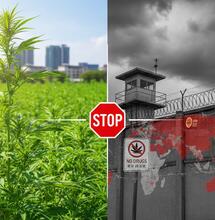Man Executed in Singapore for 2 Pounds of Weed

The case of Tangaraju Suppiah, a 46-year-old Singaporean of Tamil origin, who received a capital punishment for trying to smuggle a little over a kilogram of cannabis, confirms that the city-state with a population of 5.5 million has no intention to reform its justice system, which is particularly rigid on drug crimes.
Tangaraju Suppiah, a 46-old from Singapore, was hanged at dawn on Wednesday, April 26, in the city's Changi Prison. The man was ruled a death sentence in 2018 for "abetting the trafficking of more than one kilogram of cannabis (1,017.9 grams)" from Malaysia to Singapore in 2013.
The case marked Singapore's first execution since 2022 and has shocked the international community. Authorities proceeded with the execution despite repeated pleas from human rights campaigners and representatives of international organizations including the United Nations to reconsider the decision.
Activists believe that the man had been convicted on weak evidence and he only had limited legal access during his trial. However, Singapore authorities defended its courts and said he had been treated fairly throughout the prosecution.
The court alleged that Suppiah communicated with two other men who were also convicted of trying to smuggle weed into Singapore. The primary evidence tied to the offence reportedly were two phone numbers found on the mobile phones of the other men, one of which had been used to coordinate the cannabis delivery.
The Transformative Justice Collective (TJC), a local abolitionist movement, said in its statements that the evidence was "shockingly thin."
"The case against Tangaraju is largely circumstantial and based on inferences," the TJC statement said. "He never touched the cannabis he was accused of attempting to traffic."
"Tangaraju was already in remand for a separate offence by the time he was linked to this case – and his mobile phones were never recovered for analysis," adds the statement.
Cannabis has been legal in a growing number of countries, making it all the more unbelievable that the execution of Tangaraju Suppiah really went ahead.
"It is just illogical to know that countries nearby are enjoying cannabis in food and beverages, and using it for its medical benefits, while our country is executing people for the very same substance," the Transformative Justice Collective said.
The number of executions for drug-related crimes has surged around the globe recently. Singapore's government takes a firm position that capital punishment is successful at preventing drug trafficking and that the current drug laws are needed for the sake of public safety. They are not alone in this kind of thinking, unfortunately.
Death sentences for drug-related offenses have also taken place in Saudi Arabia, Iran, China, North Korea, and Vietnam – all of them countries in Asia. According to Harm Reduction International (HRI), a non-profit that has monitored global drug executions since 2007, the worst year on record has been 2015 when the organization observed more than 700 cases where drug convicts became subject to the death penalty.
Between 2016 and 2018, the figures slightly improved, with the number of executions on drug-related charges going down to less than 100 cases in 2018. However, over the last few years, the numbers are increasing again. Last year, in 2022, capital punishment cases moved close to 300. There is a lack of transparency for many of the cases, and it is not known how many exactly involve cannabis.











